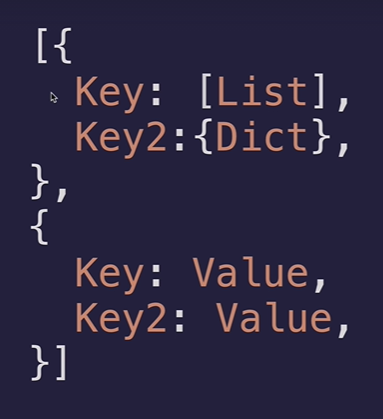Dictionary
{Key: Value}
Best Practive - formatting: next line, indent, comma at the end,

- retreiving the item: dictionary has a key. dictionary["key"]
- adding new items to dictionary: dictionary["new_word'] = "it will be added in the dictionary."
- empty dictionary: empty_dictionary = {}
can be used to wipe an existing dictionary: - Edit an item in a dictionary: can enter a new entry to change the value.
- Loop through a dictionary: only key will be printed out, if you want keys and values printed out, code below will do so.
for key in programming_dictionary:
print(key)
print(programming_dictionary[key]) #-> retrieval codeExercise 1. Grading Program
student_scores = {
"Harry": 81,
"Ron": 78,
"Hermione": 99,
"Draco": 74,
"Neville": 62,
}
# 🚨 Don't change the code above 👆
#TODO-1: Create an empty dictionary called student_grades.
student_grades = {}
#TODO-2: Write your code below to add the grades to student_grades.👇
for key in student_scores:
if student_scores[key] >= 91:
student_grades[key] = "Outstanding"
elif student_scores[key] >= 81:
student_grades[key] = "Exceeds Expectations"
elif student_scores[key] >= 71:
student_grades[key] = "Acceptable"
else:
student_grades[key] = "Fail"
# 🚨 Don't change the code below 👇
#print(student_scores)
print(student_grades)using the correct data type is important.
*curly braces
Nesting
{
key: [List],
key2: {Dict},
}Nested dictionary inside the dictionary
- Accessed by its keys
travel_log = {
"France": {"cities_visited": ["Paris", "Tour"], "total_visits": 2},
"Germany": {"cities_visited": ["Berlin"], "total_visits": 1}
}
print(travel_log)Nesting a dictionary inside a list
- Inside the list, dictionaries are accessed by their index. First dictionary will be index 0, second index 1

Exercise 9.2 Dictionary in List
travel_log = [
{"country": "France", #-> datatype: string
"cities_visited": ["Paris", "Tour"], #-> datatype: list
"total_visits": 2}, #-> datatype: number
{"country": "Germany",
"cities_visited": ["Berlin"],
"total_visits": 1}
]
print(travel_log)travel_log = [
{
"country": "France",
"visits": 12,
"cities": ["Paris", "Lille", "Dijon"]
},
{
"country": "Germany",
"visits": 5,
"cities": ["Berlin", "Hamburg", "Stuttgart"]
},
]
#🚨 Do NOT change the code above
#TODO: Write the function that will allow new countries
#to be added to the travel_log. 👇
#<my code>
def add_new_country(add_country, add_visits, add_cities):
travel_log.append({
"country": add_country,
"visits": add_visits,
"cities": add_cities
})
#<Angela's code>
def add_new_country(country_visited, times_visited, cities_visited):
new_country = {}
new_country["country"] = country_visited
new_country["visits"] = times_visited
new_country["cities"] = cities_visited
travel_log.append(new_country)
#🚨 Do not change the code below
add_new_country("Russia", 2, ["Moscow", "Saint Petersburg"])
print(travel_log)
Exercise 9.3 Secret Auction
I searched how to get a max number in dictionary, however, Angela intended creating a function that loops through a dictionary.
from replit import clear
from art import logo
print(logo)
def finding_winner(bidders_info):
highest_bidder = 0
winner = ''
for key in bidders_info:
bidder_price = bidders_info[key]
if bidder_price > highest_bidder:
highest_bidder = bidder_price
winner = key
print(logo)
print(f"\n{winner} is a winner with a bid of ${highest_bidder}.")
auction_finished = False
bidder_dict = {}
while not auction_finished:
name = input("What is your name?: ")
bid_amount = int(input("What's your bid?: $"))
bidder_dict[name] = bid_amount
other_bidders = input("Are there any other bidders? Type 'yes' or 'no' : ")
if other_bidders == "yes":
clear()
print(logo)
elif other_bidders == "no":
clear()
finding_winner(bidder_dict)
auction_finished = True
logo = '''
___________
\ /
)_______(
|"""""""|_.-._,.---------.,_.-._
| | | | | | ''-.
| |_| |_ _| |_..-'
|_______| '-' `'---------'` '-'
)"""""""(
/_________\\
.-------------.
/_______________\\
''' #parameter "bidder_dict" is a generic name for any ditionary that will be used in the future
#dict bids is an example of a dictionary that will be assigned through fuction bid()
#We can get both winning bidder's name and amount by assigning highest amount bidder's name to winner variable after judging the amount.
bids = {
"e": 212,
"d": 23
}
def bid(bidder_dict):
highest_bidder = 0
winner = ""
for bidder in bidder_dict:
bidder_price = bidder_dict[bidder]
if bidder_price > highest_bidder:
highest_bidder = bidder_price
winner = bidder
print(f"{winner} is a winner with a bid of ${highest_bidder}.")
bid(bids)
https://www.kite.com/python/answers/how-to-find-the-max-value-in-a-dictionary-in-python